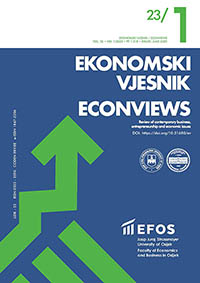Consumer ethnocentrism influence in choosing a hotel in domestic tourism – evidence from Romania and Croatia
Consumer ethnocentrism influence in choosing a hotel in domestic tourism – evidence from Romania and Croatia
Author(s): Cristina Fleșeriu, Katarina Kostelić, Vlad BocăneţSubject(s): Marketing / Advertising, Tourism, Socio-Economic Research
Published by: Sveučilište Josipa Jurja Strossmayera u Osijeku, Ekonomski fakultet u Osijeku
Keywords: consumer ethnocentrism; CETSCALE; defensive patriotism; protectionism; consumer preference; hotel chain;
Summary/Abstract: Purpose: The role of consumer ethnocentrism (CE) in choosing a hotel is still not well explored. This research aims to identify if there is a relationship between CE and the preference of Romanian/Croatian respondents for a hotel belonging to a domestic chain vs. international (foreign) chain. Methodology: Exploratory and descriptive research was performed. The data were collected through an online survey, aiming for a quota sample stratified by age and gender. The resulting sample comprises 714 and 832 valid questionnaires in Romania and in Croatia, respectively. Factor analysis, nonparametric correlation analysis, and hypothesis testing were performed. Results: “Defensive patriotism” and “protectionism” were identified as CE factors. CE is moderately expressed for Croatian and Romanian respondents. Respondents from two countries with higher CE factors prefer a national rather than an international hotel. Customers who grew up in the communist era have higher ethnocentrism scores on defensive patriotism and protectionism and prefer national hotels more than those formed in the post-communist period. Conclusion: The results of this research relate to the previously revealed regularity that ethnocentric consumers prefer buying national rather than foreign goods and services. The same is now confirmed for respondents’ hotel preferences when engaging in domestic tourism, contributing to closing a research gap. However, the results indicate that polycentric consumers might evaluate hotels by other criteria and not necessarily by their association with an international chain. In addition, in the case of rechecking post-COVID-19 results, the results presented here can serve as a pre-COVID-19 baseline.
- Issue Year: 36/2023
- Issue No: 1
- Page Range: 181-200
- Page Count: 20
- Language: English

